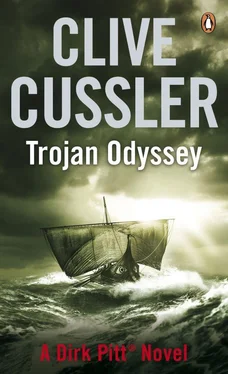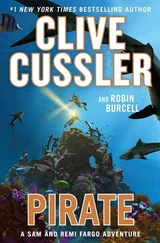Boyd added another plus to Perlmutter's report. "Homer mentioned fourteen rivers in and around Troy. There is an amazing correlation with the fourteen rivers near the East Anglian plain. Wilkens discovered that even after thirty centuries their names remained very similar in spelling and could easily be compared. In Greek, for example, Homer alludes to the Temese River. This translates to the Thames."
"And the Trojans?" queried Sandecker, still not totally convinced.
"Their army came from all over England, Scotland and Wales," Perlmutter moved on. "They were also aided by allies from Brittany and Belgium on the continent. And now that we have the bay and the plain we can begin zeroing in on the battleground and defenses. Two immense parallel ditches still exist northeast of Cambridge. Wilkens believes they were built by the invaders, much like the trenches of World War One, to keep the defenders from attacking the camp and ships."
"Then where was the citadel of Troy?" Sandecker persisted.
Perlmutter took up the challenge. "The best bet goes to the Gog Magog Hills, where large earthworks of round fortifications with deep defensive ditches have been discovered and excavated, which revealed evidence of wooden palisades and many bronze artifacts. Funeral urns and vast numbers of skeletons that showed signs of mutilation have also been uncovered."
"Where did the odd name of Gog Magog come from?" asked Summer.
"Many years ago, as residents began accidentally uncovering an army of bones, they referred to it as the site of a great battle or war with immense slaughter. They were reminded of Ezekiel's biblical conjuring up of evil spirits in a war launched by King Gog of Magog."
Sandecker looked from Boyd to Chisholm. "All right, now that we've heard how the Trojan War was fought in southern England over tin mines, what has it got to do with the Celtic discoveries by Dirk and Summer on Navidad Reef?"
The two scholars exchanged amused looks. Then Boyd said, "Why, everything, Admiral. Now that we're reasonably sure the true battle site of the Trojan War was in England, we can begin to tie Odysseus' great voyage of adventure to Navidad Bank."
You could have heard the proverbial pin drop in the conference room. The bombshell was so unexpected that it was nearly half a minute before anyone could bring themselves to respond.
"What are you saying?" asked Gunn, trying to digest what he had just heard.
Sandecker turned slowly to Perlmutter. "St. Julien, do you go along with this craziness?"
"Not crazy at all," said Perlmutter, with a broad grin. "It was written in Homer's epics that Odysseus was king of the island of Ithaca. But the Greek island never had a kingdom nor does it have any significant ruins. Wilkens shows, to my satisfaction, at least, that Odysseus' kingdom was not in Greece. A Belgian attorney from Calais, France, Theophile Cailleux, after much research, claimed that Cadiz, Spain, was the site of Homer's Ithaca. And although the land has filled in over the past three thousand years, geologists can show the outline of several islands that are now part of the mainland. Cailleux and Wilkens have identified most of Odysseus' ports of call, none of which are in the Mediterranean."
"I have to agree," said Yaeger. "By using all the known information on Odysseus' itinerant voyage, Homer's descriptions, Cailleux and Wilkens's theories, Bronze Age navigation methods, tides and currents, Max and I have arrived at a travel plan for his ports of call."
Yaeger picked up the remote and pressed a numbered code. A chart of the north Atlantic Ocean filled the screen. A red line traveled down the coast of Africa from southern England before it crossed over the water past the Cape Verde Islands into the isles of the Caribbean. He used a laser beam as a pointer and began to trace Odysseus' journey from England.
"Odysseus' first landfall after being swept out to sea was what he described as the Land of the Lotus Eaters. According to Wilkens, this was probably the West Coast of Africa at Senegal. Lotus here is a genus of the pea family and readily consumed by the natives for thousands of years, since it has a narcotic effect. From there, the winds took him west to the Cape Verde Islands, which is the logical choice for the island of the Cyclops, because Odysseus' description matches them almost perfectly."
"That land of one-eyed people," Sandecker said with a tight smile.
"Nowhere does Homer suggest all of the people had one eye," Yaeger explained. "They had two, only Polyphemus had one, and it wasn't in the middle of his forehead."
"If I recall my Odyssey," said Gunn, "after escaping the Cyclops, Odysseus was then blown west across the sea to the Aeolian Isle."
Yaeger merely nodded. "By computing the prevailing winds and currents, I put Odysseus' next landfall somewhere on one of the many islands south of Martinique and north of Trinidad. From there, he and his fleet were driven by a storm to the Land of the Laestrygonians. Here, one of the small islands called Branwyn, off Guadeloupe, fits the bill. The high cliffs on each side of the narrow channel he described his ship entering matches the island geography to a T."
"This is where the Laestrygonians destroyed Odysseus' fleet," added Perlmutter.
"If that were true," said Yaeger, "the ships loaded with treasure would still lie in the silt of the harbor."
"What is the name of the island?"
"Branwyn," responded Yaeger, "was a Celtic goddess and one of the three matriarchs of Britain."
"What country owns the island?" asked Dirk.
"It's privately owned."
"Do you know by whom?" asked Summer. "A rock star, an actor, maybe some wealthy businessmen?"
"No, Branwyn is owned by a wealthy woman." He paused to check his notes. "Her name is Epona Eliade."
"Epona is the name of the Celtic goddess," said Summer. "Now there's a coincidence."
"Maybe more than mere serendipity," said Yaeger. "I'll check it out."
"Where was Odysseus' next port?" asked Sandecker.
"Now with only one ship out of twelve," Yaeger continued, "he sailed to the island of Circe, called Aeaea, which computes as Navidad Bank, a spot Homer placed on the edge of the world."
"Circe!" Summer gasped. "Circe was the woman who lived and died in the structure we found?"
Yaeger shrugged. "What can I say? This is all conjecture, which is next to impossible to prove."
"But what brought her across the ocean so many centuries ago?" Gunn wondered aloud.
Perlmutter placed his folded hands on his ample stomach. "There was more travel back and forth between the continents than anyone has envisioned."
"I'd be interested in learning where you place Hades," said Sandecker to Yaeger.
"The best guess is the Santo Tomás caverns on Cuba."
Perlmutter daintily blew his nose, then asked, "After he left Hades, where did he meet with the Sirens, Scylla the monster and Charybdis the whirlpool?"
Yaeger threw up his hands. "I have to write those events off to Homer's wild imagination. No geographical location works for any of them this side of the Atlantic." He paused a moment before picking up Odysseus' journey on the chart again. "Next, Odysseus sails eastward until he reaches Calypso's island of Ogygia, which Wilkens and I agree is St. Miguel in the Azores."
"Calypso was the beautiful sister goddess of Circe," said Summer.
"They were women of the very highest rank. Didn't Odysseus and Calypso spend a romantic interlude together in a virtual garden paradise after his affair with Circe on her island?"
"He did," Yaeger replied. "After Odysseus leaves a tearful Calypso on the shore, his final stop is a detour by adverse winds to the palace of King Alcinous, which works out to be Lanzarote Island in the Canaries. After relating his adventures to the king and his family, he is given a ship and finally makes his way home to Ithaca."
Читать дальше












